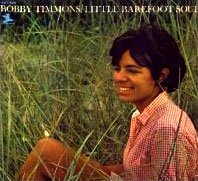Little Barefoot Soul - Bobby Timmons

Probably most widely known for being the composer of the Art Blakey (Jazz Messengers) classic Moanin', Bobby Timmons lays down some equally (if not more) funky tracks on these Prestige sides, originally released as Little Barefoot Soul and Chun-King. The opening title track gets off to solid, soulful groove simply stated by Sam Jones and and Ray Lucas - Timmons< strolls for a chorus and then enters with the the melody and doubles the bass riff with his left hand. The solo to follow is classic hard-bop of the period: The first few choruses a bit Monkish with some nicely percussive clusters and fragmentations of the line as the vamp continues underneath. The tension created has the energy built up nicely by the time Jones settles into a walking line. Timmons continues a his bluesy solo, punctuating with some interesting descending diminished lines (that set the stage for more explorations in this tonality) and other brief forays away from the standard blues changes that one would anticipate - all working together to keep the tune fresh and engaging.
Little One opens with an infectious riff on top of which Timmons lays down a brilliantly voiced theme. His use of dense, clustered chords to state this theme sets up wonderful tension that's released as the group launches into the bridge. The openeing vamp is returned to and is held through Timmons' solo (reminiscent of Bud Powell's classic Una Poco Loco, though noticeably less searing/pyrotechinically dazzling) which again makes use of clever and sparing departures from the basic tonality.
Timmons sticks close to the melody on his solo interpretation of Nobody Knows the Trouble I've Seen. Apart from not being a blues, this change in orchestrations helps to change up the mood - while still a bluesy reading of the tune, this piece stands out nicely just by dint of not being a blues form. Bobby makes some tasteful nods to Monk on this track - but the tune is a good example of Timmons somewhat unique way of approaching a ballad as a solo. On the Prestige Trio sessions reissue, this tune is placed 5th - it appeared third on the original Little Barefoot Soul (Prestige PR 7335), a placement which did a lot more to break up the blues progression-based pieces on the record.
Cut Me Loose Charlie - yet another blues form - also opens with a propulsive bass and drum vamp, a motif that's used throughout the tune, both as a device to create some tension under Bobby's solo, and a way to differentiate the tune's feel from that of the other blues progression-based songs on the album.
Ain't Thinkin' 'Bout It is another blues, rendered in a more standard fashion (no vamp, that is) - and though highlighted by some interesting, clustered chord voicings in the opening theme statement, this tune soon becomes the most forgettable number on the record: A typical arrangement and interpretation of the blues form in the soul-jazz/hard-bop vocabulary that Timmons was speaking in at the time. This said, the tune is nonetheless a great study of Timmons' playing form this period - full of textbook examples (along with some not-so-textbook, more atonal ventures) of the post-Powell, funkier school of piano playing that Timmons was defining in the early 60s.
Another blues, Walkin'-Wadin'-Sittin'-Ridin' closes the set with an easy groove - Bobby's solo is marked by some nice uses of space, interspersed with some faster Powell-flavored runs that seem to want to push the rhythm section into double-time. Jones & Lucas hold it steady, with Timmons reeling it back in to bluesy statements and more occasionally Monkish lines & clusters. (This tune is presented 2nd on the Prestige reissue - again, it's placement as the final cut on Little Barefoot Soul seems to better suit the arc of the album as a whole).
Apart from being a groovin and enjoyable record to listen to as well a crash course in how to play funky, soulful hard-bop piano, Little Barefoot Soul is also a fine example of how to keep what's essentially an album full of blues from sounding stale. Timmons steers clear of dazzling technical displays or complex arrangements to get his point across while keeping it fresh. Instead, his generally sparing solos make deft use of thematic development, well-placed blues cliches and sporadic dashes of unexpected harmonies and tonalities - all mixing up into a recipe for an album full of blues that comes off as much more than I-IV-V progressions and tired blues licks.
Little Barefoot Soul (Prestige PR 7335)
Rudy Van Gelder Studio, Englewood Cliffs, NJ
June 18, 1964



